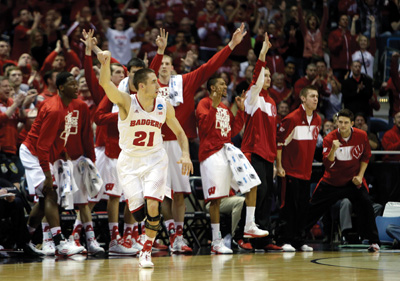As another season of March Madness draws to a close, and recognition of the Werner ladder sponsorship hits its peak, the public — including HBO’s John Oliver — is seemingly obsessed with one enduring question: Should college athletes be paid?
What is lost in translation is that the question is itself an intellectual trap — college athletes who earn grants-in-aid for their performance on the field and court are already compensated. The real question is why the American public tolerates the multibillion-dollar college sport industry handsomely profiting from the work of a largely anonymous labor force, the majority of whom are racial minorities.
NCAA power five conference football and basketball “profit athletes” toil in a netherworld unlike any other in American labor. Apart from Northwestern University football players, who as of this writing are recognized as employees under the National Labor Relations Act, these athletes lack employee status. Simultaneously, they do not enjoy the full complement of rights afforded other students, since their athletic participation is deemed a privilege, not a right. Under the disguise of privilege, their rights as students are severely abridged.
For decades, athletes in the NCAA Division I sports of football and college basketball have not had access to fair compensation and due process. Often facing short- and long-term health risks in unsafe workplaces, working 40 to 60 hours per week, and being coerced into remaining silent out of fear for their futures, these athletes are denied basic civil and human rights available to other employees. Within this “privileged” environment, these athletes are obligated to adhere to strict conduct codes — unilaterally imposed by athletic administrators — that severely limit their public speech. Under the current NCAA Collegiate Model, everyone involved in the big-time college sport enterprise, including coaches, campus athletic administrators and NCAA personnel, are permitted to partake in the free market, with the explicit goal of generating as much revenue as possible. Only the athletes are to remain amateurs unable to seek just compensation for their efforts.
 |
March Madness will still attract fans if athletes are allowed to bargain freely for their services.
Photo by: GETTY IMAGES
|
More recently, barred by NCAA rules from retaining representatives who could advocate on their behalf, profit athletes have looked to the legal system and the court of public opinion for relief and support. Meanwhile, conferences, universities and the NCAA national office, with their cultivated and contractual media relationships, have attempted, through strategic advertising and rebranding campaigns, to construct a narrative that professional-caliber NCAA sports are really about “student athletes” who will “go pro in something other than sports.”
Consequently, many conversations regarding profit athletes’ employment status devolve into hand-wringing about college athletes receiving paychecks and that somehow employment status precludes college athletes from being students. It is as if the many college students who also earn a paycheck while in school don’t exist.
Recognizing that in many fundamental ways the current system isolates NCAA profit athletes, a national coalition of faculty — the College Athletes Rights and Empowerment Faculty Coalition (CARE-FC) — has recently formed to express concern about the academic and economic mistreatment of college athletes in the NCAA D-I profit sports of football and basketball. CARE-FC’s mission is to support profit athletes in their quest to fundamentally change the existing college sport industry and be recognized as employees who deserve protections afforded such status.
CARE-FC asserts the path to the transformation of college sport rests primarily with the athletes themselves. Such an authentic collegiate model of athletics would be absent the current hypocrisies unworthy of the higher educational institutions that serve as the promoters and sponsors of today’s multibillion-dollar college sport and entertainment industry.
CARE-FC’s advocacy on behalf of profit athletes is not to determine a level of compensation or even what form that compensation takes. We argue these workers have the right to determine their value in an environment free of illegal (see O’Bannon v. NCAA) and unilaterally imposed NCAA and conference rules.
Ironically, if, or when, profit athletes are permitted to bargain freely for their services, consumers of big-time college sporting events will likely see few changes in the product they have enjoyed for many years. Competitions such as bowl games and March Madness will still attract thousands of live spectators with millions more following the action on various media platforms. These events, which are already produced and broadcast with nearly no mention of education, will continue to mimic NFL and NBA contests in form and presentation.
Though the NCAA vehemently argues consumers will flee from their previous consumption patterns if players can be fairly compensated, there has been no evidence that in the wake of the plaintiffs’ victory in O’Bannon that the American public has curtailed its nearly insatiable desire to attend and watch big-time college sporting events.
Perhaps the NCAA and its diminishing number of ardent supporters, most of whom have enjoyed the fruits of profit from athletes’ labor through the subsidization of nonrevenue college sports, recognize the general public, as well as the NCAA’s corporate partners, simply want the games to go on, even if that means NCAA profit athletes will have equal access to the big-time college sport market.
Ellen Staurowsky (ejs95@drexel.edu) is professor of sport management at Drexel University and co-founder of the College Athlete Rights and Empowerment Faculty Coalition (CARE-FC). Richard Southall (southall@hrsm.sc.edu) is associate professor of sport and entertainment management, director of the College Sport Research Institute at the University of South Carolina and co-founder of CARE-FC.





